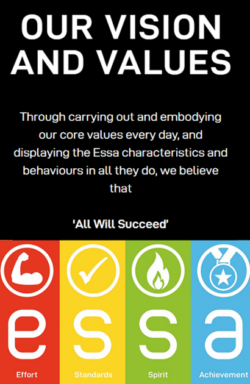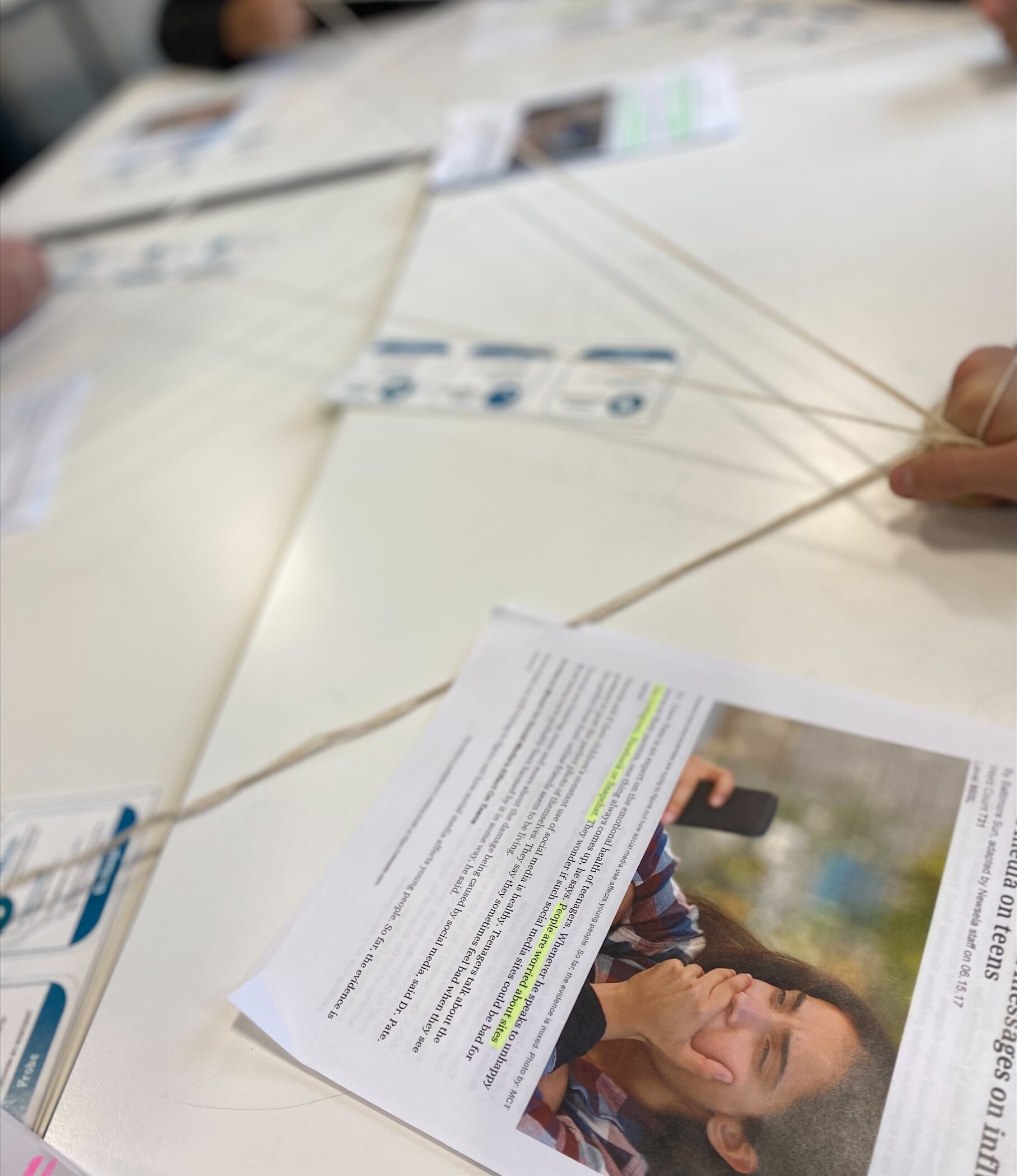Preparing their students for the wider world is something that teachers at Essa Foundation Academies Trust in Bolton are incredibly passionate about. When embarking on their journey with Voice 21 in September 2021 the school committed to improving the quality of talk that was taking place in classrooms, corridors and the wider community.

We spoke to Assistant Principal at Essa Academy and Voice 21 School Lead, Abbie Rock, about what she has learnt about becoming a Voice 21 Oracy School and the difference it is making. We also learnt from Lisa Banks, Deputy Headteacher at Essa primary about her experience.
Essa Academy became a Voice 21 Oracy School alongside Essa Primary, at the beginning of September 2021. Delivering a high-quality oracy education was vital in order to ensure that high-quality talk could take place in classrooms from Reception to Year 11 and that it became a skill their students sustain and develop over time.
The school supports young people from Bolton to believe in themselves and leave school as ‘valuable citizens of society, community and country’. As Abbie Rock explains to us, the school educates a diverse range of pupils from a variety of backgrounds. “We have 42 different languages spoken in the school and a mix of many different cultures which is wonderful”. In spite of many students joining with “low reading ages and literacy levels we see our students over the years make significant gains so that they are ready for the wider world when they leave us.”
For Lisa and the trust as a whole, “a key priority for us moving forward is to give our pupils a voice by equipping them with the essential oracy skills they need to succeed academically, socially and personally. 88% of our pupils speak English as an Additional Language. With little or no English spoken outside of the school, it is our duty to provide pupils with oracy: a skill for life. By placing oracy at the heart of our education, as a golden thread running throughout our schools, comprehensively and with consistency, we will instil identity, self-belief and confidence into all our pupils.”
With this in mind, they set out to create a culture of high-quality talk throughout the school.
Giving the students a chance to learn through talk
Over recent years the school’s drive to improve students’ reading abilities has been a big success and is now embedded across all key stages. Essa Academy has produced resources around ‘disciplinary reading’ which have been showcased by Alex Quigley in his national training sessions. The school has seen a rapid improvement in reading ages over the past three years. But what teachers then noticed was the quality of student talk wasn’t as active or engaged as it could be. “Some of our children would go through the entire day without having an academic conversation. The importance of oracy is as important as literacy, and this is something we now need to address.” With this in mind the school set about giving their students an opportunity to express their learning through speech.
The school also wanted to focus on oracy to support and improve the confidence their students had in themselves and what they were saying. Abbie notes that they wanted pupils to recognise that it is ok to talk and understand that their voice matters. Through their emphasis on student mental health, they noticed that their students couldn’t initiate conversations when they were struggling or know how to explain how they felt. “Noticing this planted a seed. Some of our students are just not that confident in their speech and we wanted all students to be able to articulate themselves in any circumstance.” For Abbie, she wanted her students to “know how to start a conversation about mental health or even to have the confidence to chat to a teacher in the morning. Even though it might be outside of their comfort zone, we wanted to make this a habit that they become well versed at in school and they can take out into their community and the world of work.”
The journey so far
Despite only being early on in their journey as a Voice 21 Oracy School, Essa Academy are committed to delivering a programme that is tailored to the students they work with.
Out of everything they have begun to implement Abbie noted a few which have been particularly successful. “At first we hosted an off-timetable day with oracy workshops for our Year 10 students. By delivering a variety of workshops all day with them we have seen a big difference from that one session. From talking about the importance of oracy and leading a Harkness Discussion we noticed that the skills they developed then have meant that they are more confident speaking across the school.”
For the children at Essa Primary, “we have been using talk detectives in Early Years and talk tokens in KS1 to encourage all children to take an active role in lessons. In KS2 we have been developing active listening strategies and have used the talk tactics summariser role to develop listening skills as we recognised that pupils were talking at each other and not listening to what was being said.”
What is clear as oracy is embedded through the schools is that all staff are becoming committed to it. Through a staff working party, Essa Academy has begun to develop the oracy skills of staff and to ensure that oracy becomes central to their curriculum. “We are working to ensure teachers can embed oracy into their classrooms and that it will have an impact.”
Students are now becoming engaged, social and active learners throughout the school. The commitment to developing a high-quality oracy education in the school is beginning to make a difference. The school recognises that the approach they are taking will take time to embed but the benefits for their students are vital.
“I am now really noticing the changes during social times and the students’ ability to communicate clearly with their peers in and out of the classroom. It’s lovely to see students during break and lunchtime having two-way conversations with staff, which is not something many students had the confidence to do before.”
What’s next?
We asked Abbie to look forward to the rest of the academic year and their continued journey with Voice 21 and reflect on their aspirations going forward. “We want to develop more speaking opportunities in the classroom and have oracy built into the curriculum. We aim to focus on PSHE and careers initially which lend themselves to this perfectly.”
For Lisa for the children in the primary school, “we have asked staff to build the ‘talking trios’ into lessons with a focus on the role of the silent summariser. I have seen through my work in Year 4 as part of our Hinduism topic in RE that this talk tactic is already improving our pupils’ listening and understanding skills.”
A key component to the success of this journey is the champions and ambassadors for oracy that are spread across the school. “We know that focusing on reading has made a huge and lasting impact and now it is time to focus on oracy. It is really exciting for us to see what we can achieve here!”


© 2024 Voice 21. Voice 21 is a registered charity in England and Wales. Charity number 1152672 | Company no. 08165798